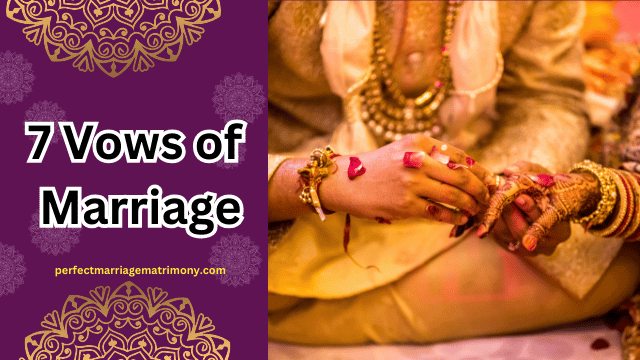Marriage is a sacred union celebrated with customs that hold deep significance. One of the most cherished traditions in Indian weddings is the Saptapadi or the 7 Vows of Marriage, where the couple takes seven steps together around the sacred fire. Each step represents a specific promise, symbolizing their commitment to each other for a lifetime.
In this article, we’ll explore the 7 Vows of Marriage, their meanings, and why they remain a cornerstone of Hindu weddings.
What Are the 7 Vows of Marriage?
The 7 Vows, also known as Saptapadi, are an integral part of traditional Hindu marriage ceremonies. The couple walks seven steps around the sacred fire (Agni), which acts as a witness to their union. Each step is accompanied by a vow that highlights the responsibilities and expectations of married life.
These vows emphasize the importance of love, trust, respect, and mutual understanding in a marriage.
Breaking Down the 7 Vows of Marriage
1. First Vow: Nourishment and Prosperity
- Promise: The couple prays for a life filled with food, wealth, and prosperity.
- Meaning: They commit to supporting each other in providing for their family’s basic needs.
Relevance Today: In modern relationships, this vow extends to building a financially stable and secure future
2. Second Vow: Strength and Health
- Promise: The couple seeks strength to face life’s challenges and remain healthy.
- Meaning: They vow to stand by each other through physical and emotional hardships.
Relevance Today: This emphasizes prioritizing each other’s well-being and fostering a supportive environment.
3. Third Vow: Wealth and Happiness
- Promise: The couple prays for wealth and happiness and promises to share them equally.
- Meaning: They agree to work together for financial stability and personal fulfillment.
Relevance Today: This vow highlights the importance of sharing responsibilities and enjoying life’s successes as a team.
4. Fourth Vow: Family and Values
- Promise: The couple promises to care for their family and uphold spiritual values.
- Meaning: They commit to raising their children with love and instilling good morals.
Relevance Today: This vow reflects the shared duty of nurturing a strong, values-based family.
5. Fifth Vow: Love and Commitment
- Promise: The couple prays for a life filled with mutual love, care, and respect.
- Meaning: They vow to cherish and prioritize each other’s happiness.
Relevance Today: Emotional intimacy and understanding are vital for a thriving relationship, making this vow timeless.
6. Sixth Vow: Togetherness and Harmony
- Promise: The couple promises to be loyal and remain by each other’s side in every phase of life.
- Meaning: They vow to maintain harmony and resolve conflicts amicably.
Relevance Today: This vow reinforces the significance of communication and mutual respect in relationships together.
7. Seventh Vow: Eternal Companionship
- Promise: The couple prays for lifelong companionship, friendship, and unity.
- Meaning: They promise to be best friends and partners for life.
Relevance Today: This vow is about fostering an enduring connection that grows stronger with time.
The Symbolism of the Sacred Fire (Agni)
In Hindu weddings, the Agni is central to the Saptapadi. It symbolizes purity and serves as a divine witness to the couple’s promises. Walking around the fire represents the couple’s journey together, with the vows acting as milestones for a happy and fulfilling married life.
Why Are the 7 Vows Important?
The 7 Vows of Marriage aren’t just rituals; they embody the essence of a strong and lasting relationship. They emphasize:
- Equality: Both partners share equal responsibility in nurturing the relationship.
- Trust: Each vow reinforces the trust needed to build a secure bond.
- Growth: The vows encourage personal and mutual growth over time.
- Spirituality: They highlight the spiritual dimension of marriage, connecting the couple on a deeper level.
How to Honor the 7 Vows in Modern Relationships
Even in today’s fast-paced world, the 7 Vows offer timeless wisdom for couples:
- Communicate Openly: Transparency strengthens trust.
- Celebrate Milestones: Acknowledge each other’s efforts and achievements.
- Resolve Conflicts Peacefully: Approach disagreements with empathy and patience.
- Keep the Romance Alive: Regularly express love and appreciation.
By honoring these principles, couples can create a balanced and fulfilling relationship.
FAQs about the 7 Vows of Marriage
1. Are the 7 Vows exclusive to Hindu weddings?
While the Saptapadi is a Hindu tradition, similar vows are present in many cultures, symbolizing universal values like love, trust, and partnership.
2. Can the vows be personalized?
Yes, many modern couples personalize their vows to reflect their unique relationship while respecting traditional values.
3. What happens if a couple doesn’t follow the 7 Vows?
The vows are symbolic and serve as guiding principles. Their essence lies in mutual understanding and commitment rather than strict adherence.
Conclusion
The 7 Vows of Marriage represent a timeless framework for building a strong and loving relationship. They guide couples in fostering trust, love, and harmony while navigating the complexities of married life.
Whether you’re planning your wedding or reflecting on your relationship, embracing these vows can help create a bond that lasts a lifetime.
